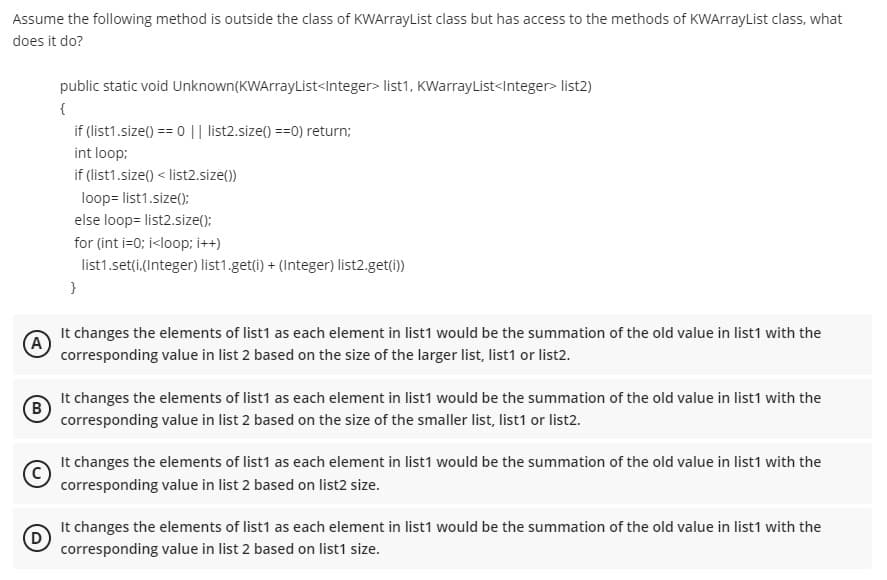ssume the following method is outside the class of KWArrayList class but has access to the methods of KWArrayList class, what oes it do? public static void Unknown(KWArrayList list1, KWarrayList list2) { if (list1.size() == 0 || list2.size() ==0) return; int loop: if (list1.size() < list2.size()) loop= list1.size(); else loop= list2.size(); for (int i=0; i
ssume the following method is outside the class of KWArrayList class but has access to the methods of KWArrayList class, what oes it do? public static void Unknown(KWArrayList list1, KWarrayList list2) { if (list1.size() == 0 || list2.size() ==0) return; int loop: if (list1.size() < list2.size()) loop= list1.size(); else loop= list2.size(); for (int i=0; i
Chapter9: Advanced Array Concepts
Section: Chapter Questions
Problem 18RQ
Related questions
Question
Solve using java

Transcribed Image Text:Assume the following method is outside the class of KWArrayList class but has access to the methods of KWArrayList class, what
does it do?
public static void Unknown(KWArrayList<Integer> list1, KWarrayList<Integer> list2)
{
if (list1.size() == 0 || list2.size() ==0) return;
int loop;
if (list1.size() < list2.size())
loop= list1.size();
else loop= list2.size():
for (int i=0; i<loop; i++)
list1.set(i.(Integer) list1.get(i) + (Integer) list2.get(i))
It changes the elements of list1 as each element in list1 would be the summation of the old value in list1 with the
A
corresponding value in list 2 based on the size of the larger list, list1 or list2.
It changes the elements of list1 as each element in list1 would be the summation of the old value in list1 with the
B
corresponding value in list 2 based on the size of the smaller list, list1 or list2.
It changes the elements of list1 as each element in list1 would be the summation of the old value in list1 with the
corresponding value in list 2 based on list2 size.
It changes the elements of list1 as each element in list1 would be the summation of the old value in list1 with the
corresponding value in list 2 based on list1 size.
Expert Solution
This question has been solved!
Explore an expertly crafted, step-by-step solution for a thorough understanding of key concepts.
Step by step
Solved in 2 steps

Knowledge Booster
Learn more about
Need a deep-dive on the concept behind this application? Look no further. Learn more about this topic, computer-science and related others by exploring similar questions and additional content below.Recommended textbooks for you

EBK JAVA PROGRAMMING
Computer Science
ISBN:
9781337671385
Author:
FARRELL
Publisher:
CENGAGE LEARNING - CONSIGNMENT

EBK JAVA PROGRAMMING
Computer Science
ISBN:
9781337671385
Author:
FARRELL
Publisher:
CENGAGE LEARNING - CONSIGNMENT